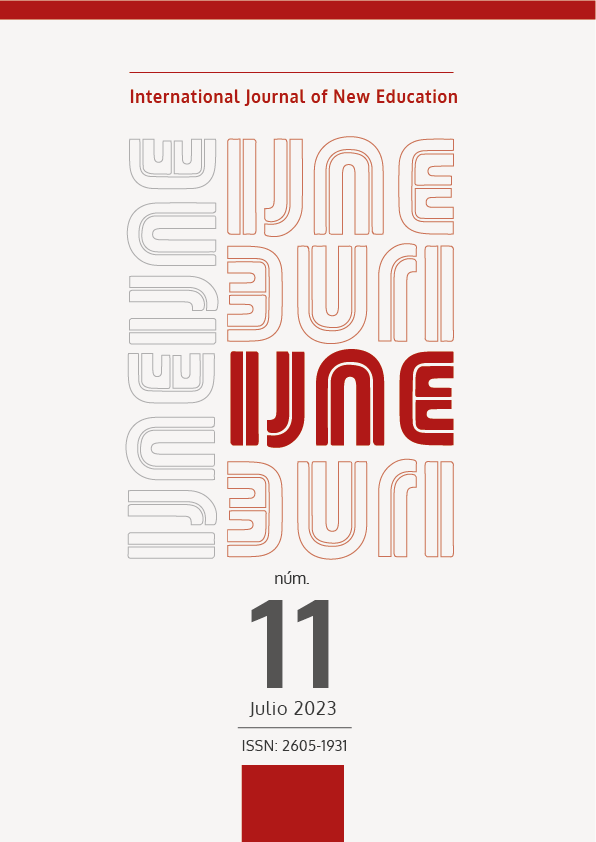Methodologies implemented by Spanish teachers during the COVID-19 pandemic
DOI:
https://doi.org/10.24310/IJNE.11.2023.16729Keywords:
Methodology, pandemic, nformation and communication technologiesAbstract
The present investigation inquired about the methodological strategies used by the teachers of the Department of Letters of the Francisco Morazán National Pedagogical University, caused by the Covid-19 pandemic, which the teachers in the teaching of Spanish needed to use to resume the educational process. interrupted by the sanitary measures decreed at the national and international level to maintain physical distancing, but given the duration of this pandemic, alternative measures called, which was called Emergency Remote Education, were sought. The objectives were to identify the strategies used by teachers, describe how they used them and record the lessons learned from this implementation.
The present investigation inquired about the methodological strategies used by the teachers of the Department of Letters of the Francisco Morazán National Pedagogical University, caused by the Covid-19 pandemic, which the teachers in the teaching of Spanish needed to use to resume the educational process. interrupted by the sanitary measures decreed at the national and international level to maintain physical distancing, but given the duration of this pandemic, alternative measures called, which was called Emergency Remote Education, were sought. The objectives were to identify the strategies used by teachers, describe how they used them and record the lessons learned from this implementation.
Downloads
Metrics
Publication Facts
Reviewer profiles N/A
Author statements
Indexed in
-
—
- Academic society
- N/A
- Publisher
- Universidad de Málaga
References
Alcaraz, A., Cruz, M., Guzmán, M., Vidal, V., Pastor, M., Rodríguez, F., & Sánchez, C. (2004). Didáctica de las Ciencias Sociales: Didáctica de las Ciencias Sociales para Primaria. Pearson Education.
Alochis, C. Deldotto, S y Vallejo, L. (2020). Usos y apropiaciones de estrategias metodológicas en épocas de pandemia en el nivel inicial, primario y secundario. Universidad Católica de Córdoba.
Bustamante, R. (2020). Educación en cuarentena: cuando la emergencia se vuelve permanente. Aportes para el diálogo y las acciones. 1-12.
Cabrales, A., Graham, A., Sahlberg, P., Hodges, C., Moore, S., Lockee, B., Trust, T., Bond, A., Lederman, D., Greene, J., Maggioncalda, J., Soares, L., Veletsianos, G., & Zimmerman, J. (2020). Enseñanza de emergencia a distancia: textos para la discusión . Learning Factor.
Delgado, J., Oyola., & Pardo, D. (2022). La educación remota de emergencia en casa y la generación de aprendizajes significativos.https://ciencia.lasalle.edu.co/cgi/viewcontent.cgi?article=1742&context=maest_docencia
Díaz, D. (s.f.). TIC en Educación Superior: Ventajas y desventajas. Educación y Tecnología . 44-50. file:///C:/Users/sonia/Downloads/Dialnet-TICEnEducacionSuperior-5072156.pdf
Díaz-Castrillón, F. & Toro-Montoya, A. (2020). SARS-CoV-2/COVID-19: el virus, la enfermedad y la pandemia. 24 (3). https://docs.bvsalud.org/biblioref/2020/05/1096519/covid-19.pdf.
Díaz, F. & Hernández, G. (2002). Estrategias metodológicas para un aprendizaje significativo. McGraw Hill.
García, L. (1999). Historia de la Educación a Distancia. Revista Iberoamericana de Educación a Distancia. 2 (1) 11-40. https://revistas.uned.es/index.php/ried/article/view/2084
Gobierno de Honduras. (16 de marzo de 2020). Declarar estado de emergencia sanitaria. Diario oficial La Gaceta.
Hodges, C., Moore, S., Lockee, B., Trust, T. & Bond, A. (2020). Diferencias entre la educación remota de emergencia y la educación virtual. https://er.educause.edu/articles/2020/3/the-difference-between-emergency-remote-teaching-and-online-learning
Meza, L., Torres, A. & Lara, J. (2016). Estrategias de aprendizaje emergentes en la modalidad e-learning. Revista de Educación a Distancia. 48 (5).1-30.
Organización mundial de la Salud. (2020). Enfermedad por coronavirus Covid-19. https://www.who.int/es
Organización Panamericana de la Salud. (2019). Covid 19. Novel coronavirus 2019. https://www.paho.org/sites/default/files/2021-04/COVID-ARG-2021-04-04_0.pdf
Ruiz, K., Castillo, K., & Miramontes, M. (2021). Conclusiones educativas a un año de la Covid-19: Ventajas y desventajas de la Educación remota de emergencia. Revista Boliviana de Educación. 3(5) 114-127. https://revistarebe.org/index.php/rebe/article/view/728/1926
Torrez, M. & Girón, D. (2009). Didáctica General: Colección Pedagógica Formación Inicial de Docentes Centroamericanos de Educación Básica. Editoram, S.A.
Downloads
Published
How to Cite
Issue
Section
License
Las obras se publican en edición electrónica bajo una licencia Creative Commons Reconocimiento-NoComercial 4.0 España: se pueden copiar, usar, difundir, transmitir y exponer públicamente, siempre que:
a) Se cite la autoría y la fuente original de su publicación (revista,
editorial y URL de la obra.
b) No se usen para fines comerciales.
c) Se mencione la existencia y especificaciones de esta licencia de uso.
Será responsabilidad exclusiva de los autores obtener los permisos necesarios de las imágenes que estén sujetas a derechos de autor.










16.png)
